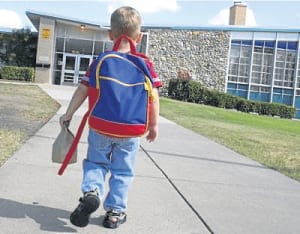A NEW school means new friends, new teachers and new class rules. Then there is the new building, the new games and, of course, the bullies.
Starting a new school can be very daunting, particularly if you are not going to be taught in your mother tongue.
Getting off to a good start is vital and can have a crucial effect on your youngsters’ confidence, attitude and performance (both socially and academically).
Rather than spending the next few weeks worrying about it, use the time wisely to help them prepare.
By planning ahead and maintaining a positive attitude, parents can make a huge difference. Having moved around the world with three young children, I know these tips are worth addressing.
1) Familiarity: In the battle against new-school angst, the first weapon in your arsenal is taking away the fear of the unknown.Primary schools start on September 10, with secondary schools a week after, but staff will be on site the week before.
If possible, take your kids on a tour the week before school starts. Most directors will encourage this and it will give you and your child a chance to ask questions.
Make sure your child knows where things are including bathrooms, play areas, dining areas and the main office. If you can, meet your child’s new teacher – especially important for younger children.
You can express any special concerns you have and ask about the possibility of the teacher assigning a ‘buddy/minder’ to help your child for the first week.
Nearly all classes here have a delegado, a student elected to represent the class and take care of newbies. Mention your child’s interests, so the teacher will have a better idea of who to assign as a buddy.
Remember to ask what materials will be needed – it’s bad enough to be the only new kid in the class, but the new kid who didn’t know he needed a semi-circle ruler? Well, that is unforgivable!
Be sure to ask about school uniforms or restrictions on clothes. Many schools, for example, don’t allow flip flops.
If you can’t visit the school, hit the net. Most Spanish schools have a website where you can do a virtual tour.
Go to the Junta’s site http://tinyurl.com/dyhbofo and find your school’s website. Check out extra-curricular activities and find something your child might be interested in. Above all, focus on all the good things about the new adventure ahead.
2) One friendly face: Make Herculean efforts to help your children meet another child in their year before the first day – just one other child in the class will make a huge difference.
This is all well and good, but how? It’s not so easy if you have just moved to a new town (the main reason for kids entering new schools).
Start close to home, by having a slow drive around the neighbourhood – look for kids of the same age then chat to the parents to see which school they go to. Now is not the time for being shy – you’re doing this for your child. If it helps, remind yourself most Spanish families don’t move and will be sympathetic towards anyone going through what they see as the unthinkable!
Invite them and their child over for a play date or ask where local children spend their time in the summer holiday.
If your child is into football, head to the campo de futbol, check out the schedule, meet the trainer, ask if they know other kids who would be on the same team.
You might also join the parents’ association (AMPA), which will probably meet before school starts.
Ask how parents can get involved – they are usually desperate for help – and quiz them on who has children in your child’s year.
3) Debunk the fear: Make sure the fear doesn’t get out of control. Part of this means ensuring our own fears are not transmitted to our children.
Remember all those times you pretended to like spiders in the hope your little ones wouldn’t be afraid of them? It’s time to put on a happy face again. Your child still takes their cues from you.
When you speak about the new school it should be presented as something exciting and positive – so focusing on ‘all those new friends’ rather than ‘what a big change’.
Having said that, it is normal for a child to feel anxious so instead of ignoring it, offer alternative ways of looking at the situation.
Let your child know that you understand it is difficult, and take time to listen.
Remind your child of other ‘firsts’ that they have experienced – the first day at their last school, or a swimming class – to help build confidence and remind them that risks can pay off. If they have previously had a bad experience, stress that this presents a new opportunity.
Click here to read more News from The Olive Press.








We are with you on this story!
Great work to create more awareness to a problem that’s still around unfortunately.
Our Thumb Buddies street smart game addresses bullying and our anti-bullying t-shirt says it all.
http://thumbbuddies.com/messages.php
Paul DeCouto